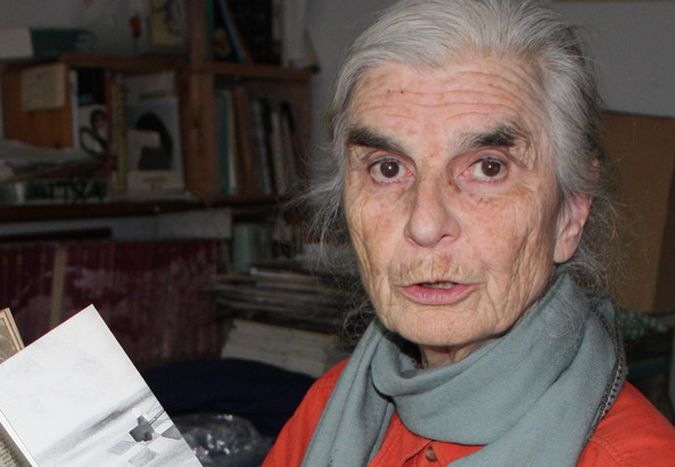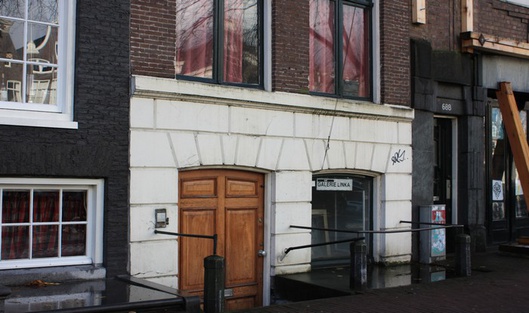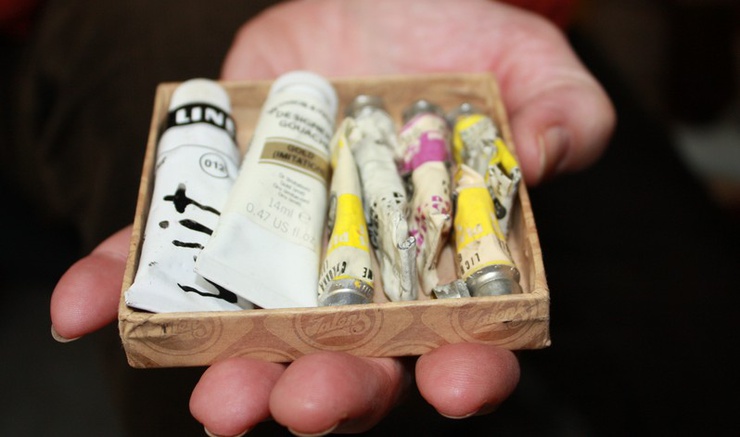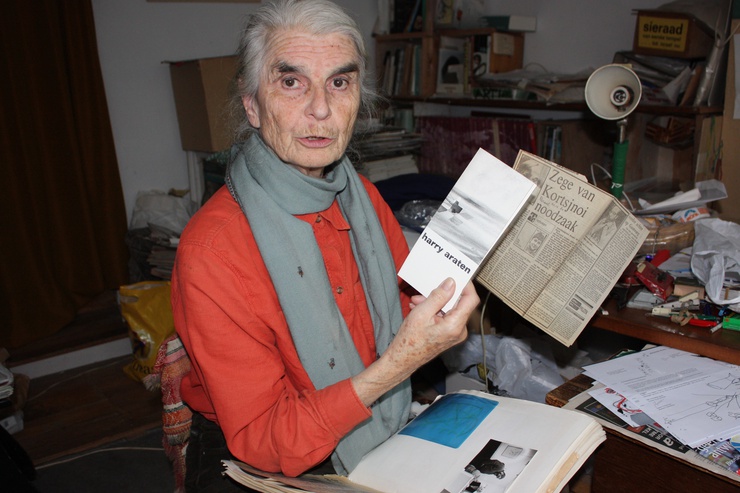
Martha Wiessing: ‘the Germans are jealous’
Published on
Translation by:
 Helen Moorhouse
Helen Moorhouse
The artist talks second world war, post-war Spain and how even being 79 doesn’t stop her converting her Jewish art gallery in Amsterdam into a multicultural ‘confessional’ every Saturday
I first met Martha Wiessing two years ago. She is the owner of and artist for the Isralite painting and sculpture gallery, Linka, located on one of the main canals in Amsterdam in Prinsengracht 690. I was impressed by the energy of this woman. Aged nearly 80, one Saturday she converted her exhibition into a make-shift and multicultural meeting to talk about everyday issues, a kind of confessional box. On my return from my trip, I was left wondering whether Martha was an Auschwitz survivor. On a November day in 2008, another Saturday, I resolve to find out more about a unique woman, who puts her listeners’ attention to the test by occasionally doodling when the urge arises during a conversation.
 It’s midday and the gallery is shut. As I knock at the door I hear someone whistling to me from the window on the third floor. Martha appears wearing a grey scarf protecting her from the first snowflakes of the year in Amsterdam. She asks me, in English, to wait a few seconds until she opens the door. When I enter, I can almost smell the memories piled up at the end of the hallway. There, newspaper cuttings, books, photos and sketches await us. In all this chaos Martha masters perfection. The warmth from the radiator which has just been switched on makes me feel at ease to start the interview. To understand the history of the gallery we have to first know Martha’s history, so when she asks What do you want me to tell you, I answer with: your life.
It’s midday and the gallery is shut. As I knock at the door I hear someone whistling to me from the window on the third floor. Martha appears wearing a grey scarf protecting her from the first snowflakes of the year in Amsterdam. She asks me, in English, to wait a few seconds until she opens the door. When I enter, I can almost smell the memories piled up at the end of the hallway. There, newspaper cuttings, books, photos and sketches await us. In all this chaos Martha masters perfection. The warmth from the radiator which has just been switched on makes me feel at ease to start the interview. To understand the history of the gallery we have to first know Martha’s history, so when she asks What do you want me to tell you, I answer with: your life.
Shouting Germans
‘As a child, I was always ill,’ Wiessing begins. ‘I recall important dates because I was always ill: September 1939, the invasion of Poland, the liberation of Holland in June 1945, when I was also in bed. I do regret that when the good-looking Canadian soldier came to rescue me he saw me looking worse for wear,’ she explains with a coy smile.

The artist describes the eight months she spent shut away in a hotel in Veluwe (a small village in the northern Holland) because of the war as a ‘fun environment for children’. Her face saddens when she tells me how she used to talk about the treatment of the Germans with the rest of the ‘guests’ of the youth hostel and explains that the innocence of childhood avoids internal conflict. ‘The only thing I couldn’t stand was the shouts from the Germans. They don’t know how to speak, only shout.’ One of the tenants in the same building as Martha is German. Every time he argues with his wife or children, Martha begs him to go outside because the loud drone of the German language drives her mad. ‘I’m old, old, I can’t remember what I was going with that,’ she says, realising her distraction. ‘Oh yeah! a child’s playground.’ She draws a scene of her obtaining water from the hotel well as she says that, something which was a daily occurrence for her. Martha believes that deep down, the Germans ‘are jealous’ of people who show signs of ‘superior intelligence’, like her and her family.
War’s end
After the war in 1945, Martha and her family were able to go home to Huyghenslaan and celebrate her Bolivian mother’s birthday after putting their home back together. ‘My father was able to get his textile factory back and our family had a speedy return to normality,’ she adds, before her great nephew Sven pops in and interrupts us to make sure everything is ok. In Spanish, Martha says that it annoys her that people so much younger than her now have to look after her. ‘Now they call me grandnanie.’ After ushering him out, like she has done since he was little, Martha picks up one of the twenty-one volumes of albums where she has collected everything to do with her gallery from the end of the fifties. We start the journey through her professional career.

Martha completed her art studies in the city of Arnhem at eighteen, in 1948. She was so excited that for the first time in her life she disturbed her father from a deep sleep; she wanted his permission to go to Spain. She had read in a catholic magazine that they were looking for a nanny in Málaga who spoke English’ it seemed like the opportunity to broaden her horizons. There was only five years between her stay in Spain and Italy, so sometimes she mixes Italian and Spanish, but the happiest six months of her life took place in Toledo. There, Martha tells us, she met people from all over the world from different cultures and with different views, in a Spain where civil guard uniforms were like ‘sinister disguises’.
‘I used to rabbit on’
In 1958, Martha settled once and for all in Amsterdam. Together with Silvia Linka, an Israeli artist who she met in Toledo, she opened up a gallery in which the ‘chatterbox’ took charge of public relations. ‘I never shut up,’ she offers. ‘That’s why I was always in trouble at school’. After flicking through Martha’s albums, I understand why for more than fifty years her gallery and home has been home to everyone. Just looking at her you can tell she has lived life to the full and that she feels at peace with herself. She is too sociable to be tied down by a family. Martha has enjoyed her life and now is closing her gallery forever.
Europe cannot be one because it is very different, but the countries in it can become closer
Before saying our goodbyes, she says that ‘the internet is Chinese’ to her, and asks me to print this interview off and send it to her by ordinary post. Her advice to all young Europeans: ‘Europe cannot be one because it is very different, but the countries in it can become closer. Without kisses in the moon, you have to wait and see, like the coming together of a painting. Be sociable, observe, and the world is your oyster.’ Before hugging me goodbye she tells me not to trust the parachute in the plane on my way home - ‘these gadgets don’t work’ - before continuing with a French song which tells the story of a boy who refuses to start courting because redheads are dangerous, brunettes untrustworthy…
Before I leave, Sven is waiting for me opposite the gallery. He warns me that he isn’t ‘authorised’ to confirm whether Martha was or wasn’t an Auschwitz survivor. Even if she didn’t want to tell me anymore, I still have her adventure in the hotel in Veluwe.
Translated from Martha Wiessing: “Sin besitos en la Luna”


